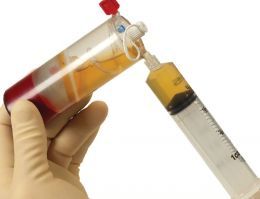Platelet-Rich Plasma Treatment Delays Cartilage Degeneration in Knee Osteoarthritis Patients
Sports medicine clinicians from the Hospital for Special Surgery (HSS), in New York City, report that platelet-rich plasma (PRP) injections improve joint pain and function in patients with osteoarthritis, a leading cause of disability that affects more than 47 million people in the United States.

Sports medicine clinicians from the Hospital for Special Surgery (HSS), in New York City, report that platelet-rich plasma (PRP) injections improve joint pain and function in patients with osteoarthritis, a leading cause of disability that affects more than 47 million people in the United States.
In their “Clinical and MRI Outcomes After Platelet-Rich Plasma Treatment for Knee Osteoarthritis” study, published online ahead of print in the Clinical Journal of Sports Medicine, Brian Halpern, MD, and colleagues injected 22 early knee osteoarthritis patients aged 30 to 70 years with 6 milliliters of PRP produced from their own blood and monitored them for one year. Fifteen of the subjects received clinical assessments at baseline, one week and one, three, six and 12 months to assess knee pain and function, and at baseline and the one year mark, their arthritic cartilage mass was evaluated with magnetic resonance imaging (MRI).
At the conclusion of their study, the HSS researchers found the PRP treatment significantly decreased pain scores on the Western Ontario and McMaster Universities Arthritis Index and the Visual Analog Scale, and it increased functional and clinical scores at both six months and 12 months. Additionally, Halpern and colleagues discovered that 73 percent of the patients experienced no further cartilage degeneration at the end of the study, despite previous research reporting typical osteoarthritis patients can lose nearly 5 percent of knee cartilage each year.
“You take a person’s blood, you spin it down, you concentrate the platelets, and you inject a person’s knee with their own platelets in a concentrated form. This then activates growth factors and stem cells to help repair the tissue, if possible, calm osteoarthritic symptoms and decrease inflammation,” Halpern said in a press release. “We are entering into an era of biologic treatment — which is incredibly ideal — where you can use your own cells to try to help repair your other cells, rather than using a substance that is artificial. The downside is next to zero and the upside is huge.”
However, Halpern noted PRP treatment for osteoarthritis still must be “pitted against a traditionally treated group in a randomized, controlled trial,” since the HSS clinicians’ study was a small-case series that lacked control subjects and only monitored 15 affected patients.
Regardless of the lack of formal case studies, Edward Magaziner, MD, CEO of New Jersey Interventional Pain Society, assistant professor at New York Medical College, clinical professor at Robert Wood Johnson University Dept. of Anesthesia and PM&R medical director of the Center for Spine, Sports, Pain Management, and Orthopedic Regenerative Medicine, in North Brunswick, N.J., said he has seen dramatic improvements in the more than 1,000 arthritic patients he has injected with PRP since 2003 — before any studies on its use for osteoarthritis were conducted in the United States.
“This study proved once and for all what we already knew in the field: That (the PRP treatment) does work and does reduce inflammation in arthritic joints,” Magaziner said. “I’ve found that, from this treatment, not only is pain going away, but function is improving ... (because) it’s turning on the manufacturing plant in the cartilage layer.”
Magaziner noted pain scores improved in many of the patients he has treated with PRP, and 80 percent or more have been able to resume normal activity, such as walking around a block or climbing stairs, as a result of the therapy.
Though Magaziner said the HSS study paves the way for more U.S. research on PRP and its impact on arthritic cartilage, he noted his practice has taken a step beyond platelets into the realm of bone marrow and fat stem cell grafts, which he said have similarly potent anti-inflammatory effects on arthritis.